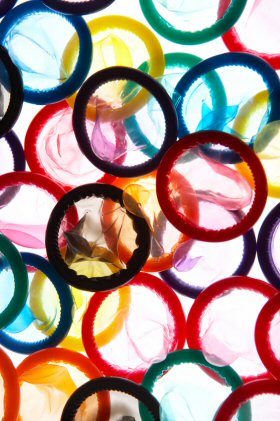13 September 2012
Sexual arousal neutralizes disgust response
by Will Parker
 Dutch researchers have found that natural responses to disgusting stimuli were lessened significantly when female subjects were sexually aroused. The researchers, from the University of Groningen, believe the findings may provide new insights into female sexual dysfunction.
Dutch researchers have found that natural responses to disgusting stimuli were lessened significantly when female subjects were sexually aroused. The researchers, from the University of Groningen, believe the findings may provide new insights into female sexual dysfunction.
The results, in the journal PLoS ONE, also shed light on the paradoxical nature of the evolutionary relevant functions of sex and disgust (believed to have evolved as a defensive mechanism to protect against external contamination). The researchers note that while saliva, sweat, semen and body odors are among the strongest disgust stimuli, people still succeed in having pleasurable sex. One explanation, they posited, was that sexual arousal might temporarily reduce the disgust response.
To investigate if disgust is turned off when we are turned on, the researchers recruited female volunteers and exposed them to one of 3 films: i) an erotic film (de Gast by Christine le Duc); ii) a sports/high-adrenalin arousal clip (rafting/sky diving/mountain climbing); and iii) a neutral film consisting of a different landscape scenes.
The participants then engaged in 16 behavioral tasks to measure the impact of sexual arousal on feelings of disgust and actual avoidance behavior. The 16 tasks included: taking a sip of juice with a large insect in the plastic cup; discarding a used tampon; reading sexually explicit passages aloud; placing fingers in a bowl of used condoms; and rubbing lubricant onto a vibrator. In reality, the insect was plastic and the other effects were simulated.
The researchers found that the sexual arousal group rated the sex related stimuli as less disgusting compared to the other groups. A similar tendency was evident for the non-sex disgusting stimuli. For both the sex and non-sex related behavioral tasks the sexual arousal group showed less avoidance behavior (they completed the highest percentage of tasks compared to the other groups).
Study leader Charmaine Borg says the findings show that sexual arousal seems to have a largely independent influence on the experience of disgust and on people's tendency to avoid disgust-relevant stimuli. She believes they also suggest that low sexual arousal might be a key feature in particular sexual dysfunctions.
"Lack of sexual arousal may interfere with functional sex, as it may prevent the reduction of disgust and disgust related avoidance tendencies. Consequently, if sexual arousal is low, the disgusting properties of specific stimuli, which are relevant for the engagement in pleasurable sex, as well as the hesitation to approach these stimuli, are not attenuated. As a result, this could lead to problems with sexual engagement," Borg explained.
Related:
Discuss this article in our forum
Ovulation goggles make Mr Wrong look like Mr Right
Brain hardwired for objectification of women
Happy men not sexually attractive to women
Source: Public Library of Science
